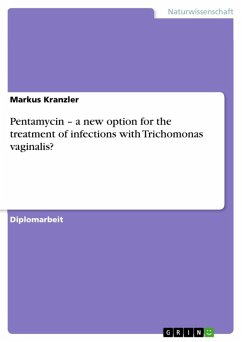Diplomarbeit aus dem Jahr 2011 im Fachbereich Biologie - Mikrobiologie, Molekularbiologie, Note: 1, Universität Wien, Sprache: Deutsch, Abstract: The protozoan parasite Trichomonas vaginalis is the causative agent of trichomonosis which is - with more than 170 million new cases each year - the most prevalent non-viral sexually transmitted disease (STD) worldwide. Although trichomonosis is not a primarily lethal disease, the clinical picture can include severe urogenital inflammations. Chronic infections have been associated with cervical/prostate cancer and a predisposition of HIV infections. In case of pregnancy, chronic infections can also lead to preterm delivery and low birth weight. For more than 50 years, metronidazole, a nitroimidazole antibiotic, has been in use for the treatment of trichomonosis. It is applied orally and although it is mostly compliant, it can have serious side effects. It is also not applicable for pregnant women due to its ability to pass the placenta. Furthermore, an increasing number of emerging metronidazoleresistant T. vaginalis strains has lead to more treatment failures in the last few years. To this day, however, there is no effective alternative drug against trichomonosis available. Pentamycin is a polyene antimycotic and has been in use in the treatment of candidiasis, in preliminary studies it also turned out to be effective against trichomonads. The aim of this study was to evaluate the efficacy of pentamycin against T. vaginalis and the ability to develop resistances in vitro. For these purposes, the dose-effect relationship between pentamycin and four differently metronidazole-sensitive T. vaginalis strains was investigated. Moreover, the protein composition before and after the treatment was compared. To induce resistance, strains were treated with sublethal concentrations of pentamycin within a time of six months. It could be shown that pentamycin is highly effective against T. vaginalis. A 100% eradication of trichomonads was reached with a concentration of 15 ;g/ml and an incubation time of 1h. All four differently metronidazole-sensitive strains showed almost the same sensitivity to pentamycin. The comparison of the protein profiles of untreated and treated cells analysed by SDS-PAGE showed that the mode of action of pentamycin is based on an interaction and subsequent damage of the cell membrane which consequently leads to total lysis and death of the cell. [...]
Dieser Download kann aus rechtlichen Gründen nur mit Rechnungsadresse in A, B, BG, CY, CZ, D, DK, EW, E, FIN, F, GR, HR, H, IRL, I, LT, L, LR, M, NL, PL, P, R, S, SLO, SK ausgeliefert werden.


